一般将来时will
will作动词的四种形式

will作动词的四种形式Will作为动词有四种形式:will, will have, will be, will be having。
下面将分别对这四种形式进行解释和举例说明。
1. willwill作为一般将来时的情态动词,表示将要发生的动作或存在的状态。
它用于表示主观的意愿、决心、承诺、预测、推测等。
例如:- I will go to the concert tomorrow.(我明天会去听音乐会。
)- She will help you with your homework.(她会帮你做作业。
)- They will arrive at the airport at 6 PM.(他们会在下午6点到达机场。
)2. will havewill have用于表示将来某一时间点之前已经完成的动作。
它表示对将来某一时刻或某一动作的预测或推测。
例如:- By the time you arrive, I will have finished cooking dinner.(等你到达的时候,我会已经做好晚饭了。
)- She will have graduated from university by next year.(她到明年会已经大学毕业了。
)- They will have arrived at the hotel before noon.(他们到中午之前会已经到达酒店。
)3. will bewill be用于表示将来某一时刻正在进行的动作或存在的状态。
它表示对将来某一时刻的预测或推测。
例如:- I will be studying for the exam this time tomorrow.(明天这个时候我会正在备考。
)- She will be working at the office all day tomorrow.(明天一整天她会在办公室工作。
)- They will be traveling around Europe next month.(下个月他们会在欧洲旅行。
will表“将来”的用法

D.win
Ⅱ.在 空 白处 填人适 当的词补 全对话 。
1.A:W ill there be a school in two years?
B t Yes,
—
—
—
—
.
2.A :
get up at six o'clock tomorrow morning?
—
—
—
—
B :Yes,I u.
3.A :
晤
否 定句 :There will+not+be+主语 +其 他 。例如 : There won't be a meeting next week.下周 不会 有会 议 。 一 般 疑 问句 :Will+there+be+主语 +其他 ?
回 固
—
—
—睁· 墨7_ 簪镬鞠_一
一
一 ~
圆 圈 圆 圈
酉妇
肯 定 回答 :Yes,there wil1.
否定 回答 :No,there won’t.例如 :
ere be sehools in the future?将 来会有 学 校2 7
一
- Yes,there wil1./No,there won't.是 的 ,有 。,不 ,没有 。
商 人 与行李
一 个 商人 拖着 他那 鼓鼓 囊囊 的特 大 号旅行 袋登 上 飞机 。真够 费 劲
的。在一 位机 组乘 务员 的帮 助下 ,他终 于设 法将 旅行 袋放 进 了头顶 上 的
~ 行李 箱 。“你 总是携 带这 么重 的行 李 ?”她 叹息道 。 “再也 不会 了 ,”那 人说道 ,“下次 ,我 待在旅行 袋里 ,我 的同伴 买票 !”
The Businessm an and His Luggage
一般将来时will的用法

一般将来时是一种常用的英语时态,表达的是将要发生的事情。
使用will可以表示将来时的意义。
以下是一般将来时will的用法:
1. 表示将来要发生的动作或存在的状态。
例如:“I will arrive at 6 o'clock tomorrow morning.”(我将在明天早上6点到达。
)
2. 表示一种意愿、意图或决定。
例如:“He will not come to the meeting.”(他不会参加会议。
)
3. 表示一种预测或假设。
例如:“It will rain tomorrow.”(明天会下雨。
)
4. 表示一种习惯或常规。
例如:“They will have breakfast at 7 o'clock every morning.”(他们每天早上7点吃早餐。
)
5. 表示一种委婉的建议或请求。
例如:“Would you mind closing the window, please?”(请关上窗户好吗?)
需要注意的是,一般将来时并不一定都使用will,有时也会使用其他表达方式,如be going to do、be about to do等。
同时,will 也可以与其他情态动词一起使用,如may、might、should等。
【语法精讲】:will表示的一般将来时的用法

【语法精讲】:(一)will表示的一般将来时的用法will是助动词,意为“将;将要;将会”,其后要接动词原形,即“will+动词原形”构成一般将来时,描述从现在来看将要发生的事情或表达对未来的预测等。
助动词will可用于各种人称,无人称和数的变化。
句子中往往有表示将来的时间状语,如tomorrow, nextweek,thedayaftertomorrow等。
注意:第一人称的一般将来时,一般用助动词shall。
WhatshallIweartotheparty?Shallweordersomecoffee?一、will的用法1.表示说话人说话时所作的决定。
例:—It’scoldinhere.―OK,Iwillclosethewindow.I’llhavethesalad,please.给我来点儿色拉吧。
2.表示说话人知道或认为将会发生的事(但并非说话人自己的意图或计划)。
例:Hermotherwillbeninetynextweek.Willhepasstheexam,doyouthink?你认为他考试能及格吗?Thisjobwon’ttakelong.这工作花不了多长时间。
3.表示请求、承诺和主动提议。
例:Willyoubuysomebreadonyourwayhome?We’llbebackearly. Willyousendthisletterforme,please?二、will的句式结构1.肯定句结构:主语+will+动词原形+其他。
IwillarriveinShanghaitomorrow.Shewillgotherenextweek.2.否定句结构:主语+will+not+动词原形+其他。
由于will是助动词,因此否定句直接在will后加not即可。
Willnot可缩略为won’t,即willnot=won’t.Iwon’tbeabletocometodinnertoday.Wewon’tbebusythisevening.3.一般疑问句结构:Will+主语+动词原形+其他?will为助动词,变一般疑问句时,直接提到句首。
一般将来时will的用法

用will表示承诺和要求
Will也常用来表示承诺和要求。它可以表达你对某件事的承诺,或者向他人提 出请求。例如: I will finish the report by tomorrow. Will you please pass me the salt?
用will表示预测和推测
Will还可以用来表示预测和推测。它可以表达对未来情况的猜测或预测。例如:
用will表示安排和计划
Will也常用来表示安排和计划。它可以表达你将要做某事,并已经安排好了。例如: I will meet you at the airport tomorrow. They will have a meeting at 3 PM.
用will表示习惯和经验
Will还可以用来表示习惯和经验。尽管它是将来时,但在这种情况下表示的是 过去经常发生的动作或情况。例如: When I was young, I will go swimming every weekend. He will always eat lunch at his desk.
在口语中使用will时,有一些常见错误要避免。例如: 错误:I will g o to the park tom orrow. (不要用will来表示明确的计划或安 排。) 正确:I'm g oing to the park tom o rrow.
常见的缩略形式
在口语中,will有一些常见的缩略形式。例如: I'll go to the store later. She won't be able to come tomorrow.
肯定句的构成
在一般将来时的肯定句中,主语后面跟上will动词,然后是动词的原形。例如: I will study for the exam. He will travel to Europe next month.
一般将来时:will
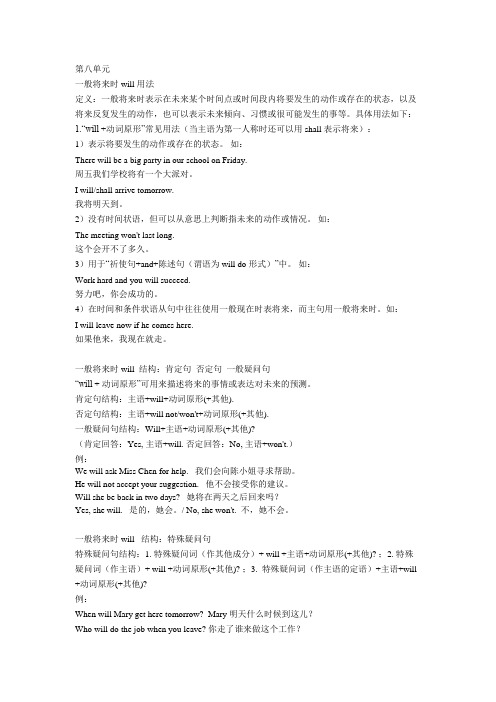
第八单元一般将来时will 用法定义:一般将来时表示在未来某个时间点或时间段内将要发生的动作或存在的状态,以及将来反复发生的动作,也可以表示未来倾向、习惯或很可能发生的事等。
具体用法如下:1.“will +动词原形”常见用法(当主语为第一人称时还可以用shall表示将来):1)表示将要发生的动作或存在的状态。
如:There will be a big party in our school on Friday.周五我们学校将有一个大派对。
I will/shall arrive tomorrow.我将明天到。
2)没有时间状语,但可以从意思上判断指未来的动作或情况。
如:The meeting won't last long.这个会开不了多久。
3)用于“祈使句+and+陈述句(谓语为will do形式)”中。
如:Work hard and you will succeed.努力吧,你会成功的。
4)在时间和条件状语从句中往往使用一般现在时表将来,而主句用一般将来时。
如:I will leave now if he comes here.如果他来,我现在就走。
一般将来时will 结构:肯定句否定句一般疑问句“will + 动词原形”可用来描述将来的事情或表达对未来的预测。
肯定句结构:主语+will+动词原形(+其他).否定句结构:主语+will not/won't+动词原形(+其他).一般疑问句结构:Will+主语+动词原形(+其他)?(肯定回答:Yes, 主语+will. 否定回答:No, 主语+won't.)例:We will ask Miss Chen for help. 我们会向陈小姐寻求帮助。
He will not accept your suggestion. 他不会接受你的建议。
Will she be back in two days? 她将在两天之后回来吗?Yes, she will. 是的,她会。
will表示的一般将来时的用法

will表⽰的⼀般将来时的⽤法【语法精讲】:will表⽰的⼀般将来时的⽤法will是助动词,意为“将;将要;将会”,其后要接动词原形,即“will+动词原形”构成⼀般将来时,描述从现在来看将要发⽣的事情或表达对未来的预测等。
助动词will可⽤于各种⼈称,⽆⼈称和数的变化。
句⼦中往往有表⽰将来的时间状语,如tomorrow, nextweek,thedayaftertomorrow等。
注意:第⼀⼈称的⼀般将来时,⼀般⽤助动词shall。
WhatshallIweartotheparty?Shallweordersomecoffee?⼀、will的⽤法1.表⽰说话⼈说话时所作的决定。
例:—It’scoldinhere.―OK,Iwillclosethewindow.I’llhavethesalad,please.给我来点⼉⾊拉吧。
2.表⽰说话⼈知道或认为将会发⽣的事(但并⾮说话⼈⾃⼰的意图或计划)。
例:Hermotherwillbeninetynextweek. Willhepasstheexam,doyouthink?你认为他考试能及格吗?Thisjobwon’ttakelong.这⼯作花不了多长时间。
3.表⽰请求、承诺和主动提议。
例:Willyoubuysomebreadonyourwayhome?We’llbebackearly. Willyousendthisletterforme,please?⼆、will的句式结构1.肯定句结构:主语+will+动词原形+其他。
IwillarriveinShanghaitomorrow.Shewillgotherenextweek.2.否定句结构:主语+will+not+动词原形+其他。
由于will是助动词,因此否定句直接在will后加not即可。
Willnot可缩略为won’t,即willnot=won’t.Iwon’tbeabletocometodinnertoday.Wewon’tbebusythisevening.3.⼀般疑问句结构:Will+主语+动词原形+其他?will为助动词,变⼀般疑问句时,直接提到句⾸。
一般将来时will的用法

4. I am checking my email. (用will改 写句子) I w_i_ll__c_h_ec_k_ my email tomorrow.
5. There is a class meeting every Tuesday. (用tomorrow改写句子) There _w_i_ll _b_e_a class meeting t_o_m_o_r_ro_w_.
⑤
⑥
_ch_e_ck_h_e_r _em__ai_l
h_a_v_e _a _pi_an_o_l_es_s_on__ _ha_v_e_a_p_ic_ni_c
Exercises
请根据句意选择正确的选项填空。
1. We'll _C__ at the school gate.
A. meets B. meeting C. meet
“will”的否定句:
They won't use books. The teachers won't write on the blackboard .
否定句:主语+ will not (won't) +动词原形
Please make sentence using will at the weekend
4).Jim and Lilli will have a picnic at the weekend.
Please make sentence using won't
teacher use chalk on the blackboard
students use pen and paper
have a lot of homework
check my email
英语语法一般将来时will be going to want to的区别

will / be going to /want to的区别一般将来时表示在将来某个时间要发生的动作或存在的状态.一 . 一般将来时的构成:1. 由助动词“ shall/ will +动词原形”构成, shall 用于第一人称, will 用于第二、第三人称,而美式英语在陈述句中无论什么人称,一律用 will .2. 一般将来时的否定和疑问形式:一般将来时的否定形式是 will not ,缩写为 won't; shall not ,缩写为 shan't .一般将来时的疑问形式是把 will/ shall 提到主语前.如: He won’t go to the park this Sunday. 本周日他不去公园.Will you go swimming with me? 和我一起去游泳好吗?二 . 一般将来时的基本用法:表示“纯粹的将来”:①表示将要发生的动作或情况,常带有表示将来的时间状语,如tomorrow, next week, in two days, from now on 等.如: It will be fine tomorrow. 明天天气晴朗.②表示预料将要发生的动作或情况.如:You will feel better after having this medicine. 吃了这药,你就会感觉好些的.③表示由于习惯倾向而会经常发生的动作,本用法中的 will 要重读.如:Boys will be boys. 〔谚语〕男孩毕竟是男孩.2. 表示“带有情态意义的将来”,用来表示意图,用will 来表示.如:I will be more careful next time. 下次我要更加小心.I won't go shopping this afternoon, but she will. 今天下午我不想去购物,但她想去.will 在疑问句中,用来表示有礼貌地征询对方的意见.如: Will you have some more tea? 要不要再喝点茶?What shall we do this weekend? 本周末我们要干什么?三 . 一般将来时的其它几种表示法:1. 用 be going to 表示:be going to 相当于一个助动词,与其后的动词原形一起构成句子的谓语,表示近期将要发生的动作或存在的状态.如: I'm going to see a film this afternoon. 今天下午我想去看电影.①“ be going to +动词原形”表示主观上打算在将来某个时间要做某事.如: Her mother is going to buy her a new bike. 她妈妈要给她买辆新自行车.②“ be going to +动词原形”还可以表示说话人根据已有的迹象认为将要发生的事.如: It's going to rain. 快要下雨了.2. 用一般现在时表示将来意义句中的动词是一般现在时,但所表示的意义却是一般将来时.如:Are you free tomorrow? = Are you going to be free tomorrow? 你明天有空吗?在时间 / 条件状语从句中,如果主句是一般将来时,从句习惯上用一般现在时表示将来的意义.如: Please tell him to gowhen he comes. 他来时,就让他去.3. 用位置移动的行为动词的现在进行时表示将来意义:这些动词有 come, go, leave, begin, arrive, start 等.如:We are leaving tomorrow .我们明天要走了一般将来时练习:( ) 1. There __________ a meeting tomorrow afternoon.A. will be going toB. will going to beC. is going to beD. will go to be( ) 2. Charlie ________ here next month.A. isn’t workingB.doesn’t workingC. isn’t going to workingD. won’t work( ) 3. He ________ very busy this week, he ________ free next week.A. will be; isB. is; isC. will be; will beD. is; will be( ) 4. There ________ a dolphin show in the zoo tomorrow evening.A. wasB. is going to haveC. will haveD. is going to be( ) 5. –________ you ________ free tomorrow?– No. I ________ free the day after tomorrow.A. Are; going to; willB. Are; going to be; willC. Are; going to; will beD. Are; going to be; will be( ) 6. Mother ________ me a nice present on my next birthday.A. will givesB. will giveC. givesD. give( ) 7. – Shall I buy a cup of tea for you?–________. (不,不要.)A. No, you won’t.B. No, you aren’t.C. No, please don’t.D. No, please.( ) 8. – Where is the morning paper?– I ________ it for you if you want it at once.A. getB. am gettingC. to getD. will get( ) 9. ________ a concert next Saturday?A. There will beB. Will there beC. There can beD. There are( ) 10. If they come, we ________ a meeting.A. haveB. will haveC. hadD. would have( ) 11. He ________ her a beautiful hat on her next birthday.A. givesB. gaveC. will givingD. is going to give( ) 12. He ________ to us as soon as he gets there.A. writesB. has writtenC. will writeD. wrote( ) 13. He ________ in three days.A. coming backB. came backC. will come backD. is going to coming back( ) 14. If it ________ tomorrow, we’ll go roller-skating.A. isn’t rainB. won’t rainC. doesn’t rainD. doesn’t fine( ) 15. – Will his parents go to see the Terra Cotta Warriors tomorrow?– No, ________ (不去).A. they willn’t.B. they won’t.C. they aren’t.D. they don’t.1. C 这个句型是there be与be going to的结合,结合后是there is going to be.2. D A是进行时态的,B与 C 构成都有问题,doesn’t 与be going to 后面都应该放动词原型.3. D 根据时间状语this week和next week断定出前半句一般现在时,根据后半句判断应该是一般将来时.4. D 理由同第一题的一样.5. D be free是固定搭配,所以无论是用be going to句型还是用will句型都不能少了be.6. B.. 根据next birthday判断,这个句子应该是一般将来时的,它的构成应该是will + 动词原形.7.C 事实上这个句子不是一般将来时,是一个请求别人许可的句子.所以回答的时候应该比较客气.8.D at once 是一个一般将来时的时间状语,所以这个用一般将来时.9.B 从句子结尾的问号看,这个句子是问句,只有B选项是按照问句的形式给出的.10.B 这是一个典型的主将从现的句型,条件从句是现在时的,主句应该是将来时的.11.D on her next birthday.这个时间状语说明时态上应该是一般将来时.12.C 这是一个典型的主将从现的句型,时间状语从句是现在时的,主句应该是将来时的.13.C in three days是一个一般将来时的时间状语,意思是三天以后,所以是一般将来时的句子.14.C 这是一个典型的主将从现的句型,主句是将来时的,条件从句应该是现在时的.15.B 所问要所答.。
“一般将来时”的几种语法形式[整理版]
![“一般将来时”的几种语法形式[整理版]](https://img.taocdn.com/s3/m/6c03bef44bfe04a1b0717fd5360cba1aa8118c39.png)
“一般将来时”的几种语法形式一般将来时的语法形式主要有四种:shall / will +动词原形;be going to +动词原形;现在进行时和一般现在时。
现将这四种形式分述如下:一、shall / will +动词原形1. will可用于所有人称,但shall 仅表示单纯将来时,用于第一人称I和we,作为will的一种替代形式。
以Y ou and I为主语时通常避免用shall。
例如:He will be back soon. 他很快就会回来。
I shall/will be free on Sunday. 星期天我有空。
Y ou and I will work in the same factory. 你和我将在同一工厂工作。
2. will, shall可用来预言将来发生的事。
如说出我们设想会发生的事,或者请对方预言将要发生什么事。
例如:It will rain tomorrow. 明天将要下雨。
3. will, shall除可表示单纯的将来时以外,还可以带有意愿的色彩,仍指的是将来。
例如:I’ll buy you a bicycle for your birthday. 你过生日时,我给你买一辆自行车。
(表示允诺) Will you open the door for me please? 请你帮我开门好吗?(表示请求)Shall I get your coat for you? 我可以为你拿外套吗?(表示提议)二、be going to +动词原形1. 表示说话人根据现在已有的迹象,判断将要或即将发生某种情况。
这类句子的主语可以是人,也可是物。
例如:There is going to be a football match in our school tomorrow afternoon. 明天下午我们学校将有一场足球赛。
(已有告示)I feel terrible. I think I’m going to die. 我感到难受极了,我想我快不行了。
【语法精讲】:will表示的一般将来时的用法

【语法精讲】:will表示的一般将来时的用法will是助动词,意为“将;将要;将会”,其后要接动词原形,即“will+动词原形”构成一般将来时,描述从现在来看将要发生的事情或表达对未来的预测等.助动词will可用于各种人称,无人称和数的变化。
句子中往往有表示将来的时间状语,如tomorrow,next week,the day after tomorrow等。
注意:第一人称的一般将来时,一般用助动词shall。
What shall I wear to the party?Shall we order some coffee?一、will的用法1。
表示说话人说话时所作的决定。
例:-It’s cold in here。
―OK,I will close the window。
I’ll have the salad,please。
给我来点儿色拉吧。
2. 表示说话人知道或认为将会发生的事(但并非说话人自己的意图或计划)。
例:Her mother will be ninety next week.Will he pass the exam, do you think? 你认为他考试能及格吗?This job won’t take long.这工作花不了多长时间。
3. 表示请求、承诺和主动提议。
例:Will you buy some bread on your way home?We’ll be back early.Will you send this letter for me,please?二、will的句式结构1. 肯定句结构:主语+will+动词原形+其他。
I will arrive in Shanghai tomorrow. She will go there next week。
2. 否定句结构:主语+will+not+动词原形+其他。
由于will是助动词,因此否定句直接在will后加not即可。
一般将来时willppt课件

特殊疑问句:特殊疑问词+will+主语+V.原形+其他 What will your dream school have?
一般将来时will
2. There be句型的一般将来时 肯定句: There will be +名词+其他成份 无论后面加单数名词或复数形式,be必须用原形。
There will be only one country. There will be many workers in this city.
1. 结构
一般将来时will
肯定句:主语+ will +动词原形e will go to the moon.
否定句:在will后面加not(will not可缩写为 won’t) They will not (won’t) use books.
一般疑问句:will提到句子主语前,结尾变问号 Will students go to school in the future?
(2)表示将来某一段时间内经常的动作或状态: The students will come and work in the lab once a week. We will come and work in this factory every year.
否定句:在will后面加not There won’t be only one country.
一般疑问句:把will提到there之前 Will there be only one country? Yes, there will. / No, there won’t.
一般将来时will
3. 用法 (1)表示将来某一时刻的动作或状态: We will come to see you the day after tomorrow. There will be a wonderful show next week.
一般将来时will结构讲解
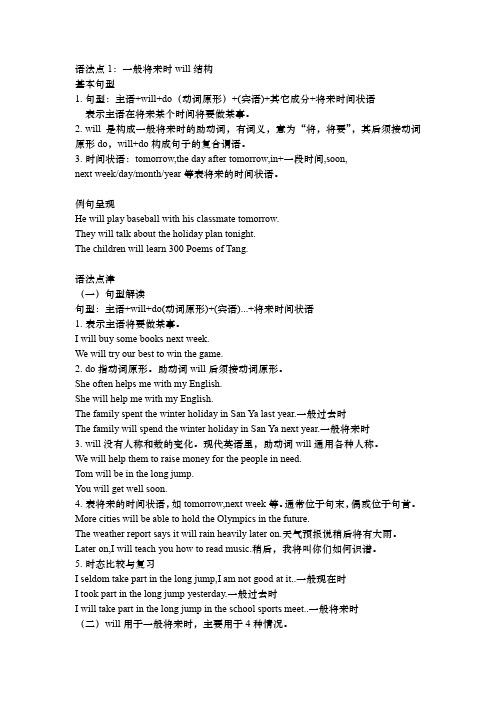
语法点1:一般将来时will结构基本句型1.句型:主语+will+do(动词原形)+(宾语)+其它成分+将来时间状语表示主语在将来某个时间将要做某事。
2.will是构成一般将来时的助动词,有词义,意为“将,将要”,其后须接动词原形do,will+do构成句子的复合谓语。
3.时间状语:tomorrow,the day after tomorrow,in+一段时间,soon,next week/day/month/year等表将来的时间状语。
例句呈现He will play baseball with his classmate tomorrow.They will talk about the holiday plan tonight.The children will learn 300 Poems of Tang.语法点津(一)句型解读句型:主语+will+do(动词原形)+(宾语)...+将来时间状语1.表示主语将要做某事。
I will buy some books next week.We will try our best to win the game.2.do指动词原形。
助动词will后须接动词原形。
She often helps me with my English.She will help me with my English.The family spent the winter holiday in San Ya last year.一般过去时The family will spend the winter holiday in San Ya next year.一般将来时3.will没有人称和数的变化。
现代英语里,助动词will通用各种人称。
We will help them to raise money for the people in need.Tom will be in the long jump.You will get well soon.4.表将来的时间状语,如tomorrow,next week等。
一般将来时的四种句型结构
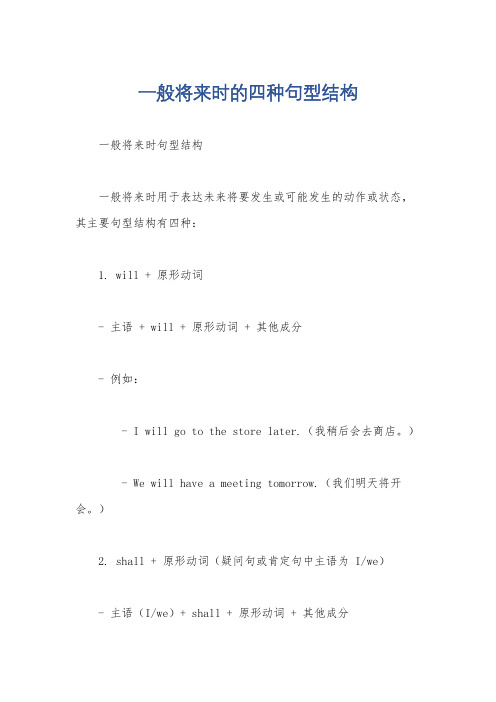
一般将来时的四种句型结构一般将来时句型结构一般将来时用于表达未来将要发生或可能发生的动作或状态,其主要句型结构有四种:1. will + 原形动词- 主语 + will + 原形动词 + 其他成分- 例如:- I will go to the store later.(我稍后会去商店。
)- We will have a meeting tomorrow.(我们明天将开会。
)2. shall + 原形动词(疑问句或肯定句中主语为 I/we)- 主语(I/we)+ shall + 原形动词 + 其他成分- 例如:- Shall I open the window?(我打开窗户好吗?)- We shall arrive at 10:00 AM.(我们将在上午 10:00 到达。
)3. be going to + 原形动词- 主语 + be going to + 原形动词 + 其他成分- 例如:- I am going to watch a movie tonight.(我今晚要去看电影。
)- They are going to build a new house.(他们打算建造一所新房子。
)4. be + about to + 原形动词- 主语 + be about to + 原形动词 + 其他成分- 例如:- I am about to leave.(我就要走了。
)- The train is about to depart.(火车就要出发了。
)一般将来时的用途一般将来时主要用于以下几种情况:- 表达未来将要发生的肯定动作或事件- 表达未来可能发生的动作或事件- 表示计划或打算- 表达预测或推测- 表示请求或建议(使用 shall 时)- 表示承诺或保证(使用 will 时)。
一般将来时的几种语法形式
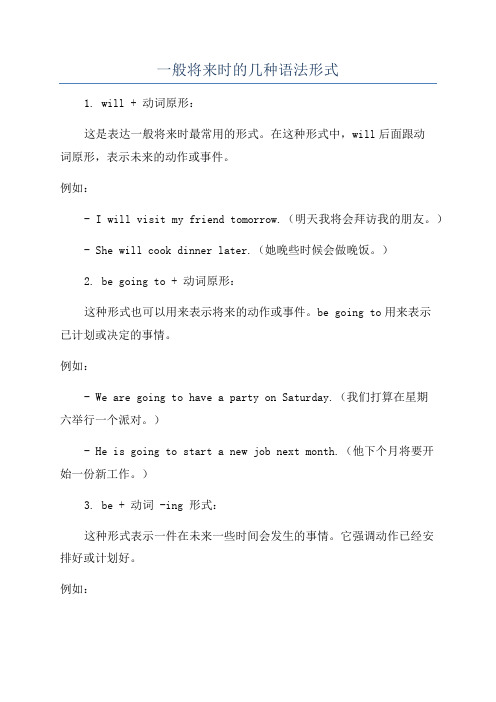
一般将来时的几种语法形式1. will + 动词原形:这是表达一般将来时最常用的形式。
在这种形式中,will后面跟动词原形,表示未来的动作或事件。
例如:- I will visit my friend tomorrow.(明天我将会拜访我的朋友。
)- She will cook dinner later.(她晚些时候会做晚饭。
)2. be going to + 动词原形:这种形式也可以用来表示将来的动作或事件。
be going to用来表示已计划或决定的事情。
例如:- We are going to have a party on Saturday.(我们打算在星期六举行一个派对。
)- He is going to start a new job next month.(他下个月将要开始一份新工作。
)3. be + 动词 -ing 形式:这种形式表示一件在未来一些时间会发生的事情。
它强调动作已经安排好或计划好。
例如:- They are traveling to Paris next week.(他们下周去巴黎旅行。
)- I am meeting my friends for lunch tomorrow.(明天我将与朋友们见面吃午饭。
)4. be about to + 动词原形:这种形式表示即将发生的事情,比如在不远的将来要发生的事情。
例如:- The movie is about to start.(电影即将开始。
)- She is about to graduate from university.(她即将大学毕业。
)5. be to + 动词原形:这种形式常用于官方通知、计划或安排。
它表示将要发生的事情是按照提前安排的程序进行。
例如:- The meeting is to be held tomorrow.(会议定于明天举行。
)- The train is to arrive at 9 o'clock.(火车将于9点钟到达。
一般将来时的三种句型结构

一般将来时的三种句型结构一般将来时,又称未来时,是表示未来某个动作或状态的时态。
在英语中,由助动词will和be going to 加上动词原形构成,常用于表示将要发生的动作或存在的状态。
今天我们就来详细介绍一般将来时的三种句型结构。
首先,我们来看will结构。
Will结构是英语中最常用的一般将来时。
它的句式结构如下:主语+will+动词原形+其他。
Will的意思是“将会”,也可以理解为“想要”,它可以表示将来某人将要做的动作,也可以表示某人对将来的打算或决定。
例如:I will go to Beijing next week.(下周我将会去北京。
)其次,我们来看be going to 结构。
Be going to 结构是表示将来的句子中使用最多的一种结构,它的句式结构如下:主语+be going to+动词原形+其他。
Be going to 结构表示某人有意图、有计划、有准备去做某事。
例如:We are going to have a party tomorrow.(明天我们要举行一个聚会。
)最后,我们来看present continuous 结构。
Present continuous结构是表示将来的另一种结构,它的句式结构如下:主语+be(am/is/are)+动词现在分词+其他。
Present continuous结构表示某人已经做好准备,正在进行准备,即将要做某事的状态。
例如:She is studying for the exam next week.(她正在为下周的考试做准备。
)以上就是一般将来时的三种句型结构,即will结构、be going to 结构和present continuous 结构。
三种句型都表示将来,但其表示的不同程度不同,具体表示的意思也不尽相同。
Will结构表示将来某人将要做的动作,也可以表示某人对将来的打算或决定;be going to 结构表示某人有意图、有计划、有准备去做某事;present continuous 结构表示某人已经做好准备,正在进行准备,即将要做某事的状态。
一般将来时的6种表达方式
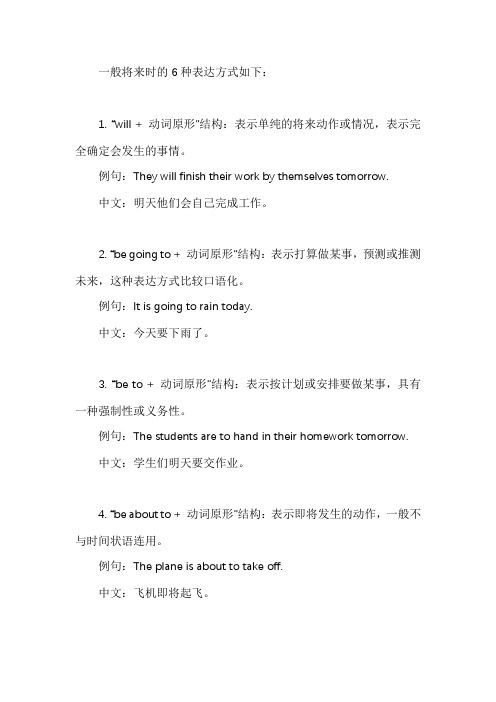
一般将来时的6种表达方式如下:
1. “will + 动词原形”结构:表示单纯的将来动作或情况,表示完全确定会发生的事情。
例句:They will finish their work by themselves tomorrow.
中文:明天他们会自己完成工作。
2. “be going to + 动词原形”结构:表示打算做某事,预测或推测未来,这种表达方式比较口语化。
例句:It is going to rain today.
中文:今天要下雨了。
3. “be to + 动词原形”结构:表示按计划或安排要做某事,具有一种强制性或义务性。
例句:The students are to hand in their homework tomorrow.
中文:学生们明天要交作业。
4. “be about to + 动词原形”结构:表示即将发生的动作,一般不与时间状语连用。
例句:The plane is about to take off.
中文:飞机即将起飞。
5. “be able to + 动词原形”结构:表示具有做某事的能力或可能性,通常用于现在时态。
例句:She is able to speak English fluently now.
中文:现在她能够流利地说英语了。
6. “be apt to + 动词原形”结构:表示具有某种倾向或易于发生某事,强调预测性。
例句:He is apt to forget his keys.
中文:他容易忘记带钥匙。
一般将来时动词规则

一般将来时动词规则
一般将来时是表示将来时间的时态,动词的形式规则如下:
1. 对于一般动词,将来时的形式为“will + 动词原形”,例如:
I will go to the store tomorrow.(我明天要去商店。
)
2. 对于对话中的承诺或意愿,将来时的形式为“be going to + 动词原形”,例如:He is going to study abroad next year.(他明年要出国留学。
)
3. 对于已经安排好的将来事件,将来时的形式为“现在进行时 + 时间状语”,例如:We are leaving at 8 o'clock tomorrow morning.(我们明天早上8点出发。
)
4. 对于已经计划好的将来事件,将来时的形式为“助动词 + 动词原形”,例如:They are going to have a meeting next week.(他们下周要开会。
)
需要注意的是,一般将来时的动词不需要加s/es (第三人称单数形式)。
- 1 -。
一般将来时will

一般将来时(will)一般将来时由“助动词+动词原形”构成,表示将来某个时间要发生的动作或存在的状态,也表示将来经常或反复发生的动作,常与表示将来的时间状语连用,如:tomorrow,next week, next year, in the future等。
例如:1.We will come to see you next week.2.In the future, there will be less fresh water.3.Will people use money in 100 years?4.How will the world be different in the future?注:1) 在口语中,will常缩略为’ll,will not常缩略为won’t。
2) 在表示“带意愿色彩的将来”时,常用助动词will。
例如:I will tell you all about it.3) 在疑问句中,主语为第一人称(I或we)时,常用助动词shall。
例如:When shall we have the party?4) 在书面语中,主语为第一人称(I或we)时,也常用助动词shall。
例如:I shall write you a letter next month. 但在口语中,所有人称都可以用will。
肯定句:主语+will/shall+动词原形+其他. 例如:She will be back in 2 days.否定句:主语+will not/shall not +动词原形+其他. will not可缩略成won’t;shall not可缩略成shan’t。
例如:She won’t be back in 2 days.一般疑问句:Will/Shall+主语+动词原形+其他?肯定回答:Yes, 主语+will/shall.否定回答:No, 主语+ will not(won’t)/shall not(shan’t).例如:Will she be back in 2 days?Yes, she will.No, she will not/won’t.特殊疑问句:特殊疑问词+will/shall+主语+动词原形+其他?特殊疑问词(作主语)+will/shall+动词原形+其他?例如:When will she be back? (对in 2 days 提问)Who will be back in 2 days? (对she提问)一般将来时(there be)there be句型的一般将来时肯定句结构:there will be ... 例如:There will be a concert in the hall this Friday.there be句型的一般将来时否定句结构:there will not (won’t) be ... 例如:There will not be a concert in the hall this Friday.there be句型的一般将来时一般疑问句结构:Will there be ...肯定回答:Yes, there will.否定回答:No, there won’t. 例如:Will there be a concert in the hall this Friday?Yes, there will./No, there won’t.一般将来时(时间词)一般将来时的时间状语:含有next的短语:next week/month/term/year ... 例如:We will go to Paris next month.含有tomorrow的短语:the day after tomorrow;tomorrow morning ...例如:There will be a meeting tomorrow morning.含有in的短语,后跟一段时间,表示“(以现在为起点)多久之后”:in 2 days/in 2 weeks ... 例如:It will be ready in a week’s time.含有this的短语,表示与现在相比较,将来的某个时候:this Tuesday/weekend ...例如:Will you come here this Tuesday?其他的一般将来时的时间状语:soon(不久后);tomorrow(明天);tonight (今晚);some day(将来的某一天);one day(将来的某一天);in the future(在未来);before long(不久后);from now on(从现在开始)例如:We’ll be home soon.I.选词填空。
- 1、下载文档前请自行甄别文档内容的完整性,平台不提供额外的编辑、内容补充、找答案等附加服务。
- 2、"仅部分预览"的文档,不可在线预览部分如存在完整性等问题,可反馈申请退款(可完整预览的文档不适用该条件!)。
- 3、如文档侵犯您的权益,请联系客服反馈,我们会尽快为您处理(人工客服工作时间:9:00-18:30)。
英语初一专题一般将来时 -will知识点精讲透析Will 是助动词,意为“将;将要;将会” ,其后要接动词原形,即”will+ 动词原形”构成一般将来时,描述从现在来看将要发生的事情或表达对未来的预测等。
助动词will 可用于各种人称,无人称和数的变化。
句子中往往有表示将来的时间状语,如tomorrow ,next week, the day after tomorrow 等。
注意:第一人称的一般将来时,一般用助动词shall.What shall I wear to the party? Shall we order some coffee?一、will 的用法1. 表示说话人说话时所作的决定。
例:—“It 's cold in here. ”—“OK,I will close the window. ”I 'll have the salad, please. 给我来点儿色拉吧。
2. 表示说话人知道或认为将会发生的事(但并非说话人自己的意图或计划)。
例:Her mother will be ninety next week.Will he pass the exam,do you think? 你认为他考试能及格吗?This job won 't take long. 这工作花不了多长时间。
3. 表示请求、承诺和主动提议。
例:Will you buy some bread on your way home?We 'llbe back early.Will you send this letter for me,please?二、will 的句式结构1. 肯定句结构:主语+will+ 动词原形+ 其他。
I will arrive in Shanghai tomorrow.She will go there next week.2. 否定句结构:主语+will+not+ 动词原形+ 其他。
由于will是助动词,因此否定句直接在will后加not即可。
Will not可缩略为won ',即will no t=w on 'I won 'tbe able to come to dinner today.We won 'be busy this evening.3. 一般疑问句结构:Will+主语+动词原形+其他?Will为助动词,变一般疑问句时,直接提到句首。
She will be our En glish teacher n ext term.一般疑问句:—►I will be a middle school stude nt next year.-—►4. 特殊疑问句结构:疑问词(组) +will+主语+动词原形+其他?What will the future be like?How will you finish your work?I will arrive in Shanghai next week.( 对戈U线部分提问)对Shanghai提问:对next week 提问:课后练习:中考链接:1. —Which team do you thi nk _______ the game?—Hard to say. There are still ten minu tes before it en ds.A.w onB. has wonC. will winD. wi ns2. This term ______ over. The summer vacati on is coming in two weeks.A. isB. wasC. has bee nD. will be巩固练习用括号内的时间状语改写句子。
1.1 visit my gran dpare nts.( next weeke nd)2. Does she speak En glish at the meeti ng?(tomorrow)3. Daming is a Grade Nine student.(in two years)4. They don 't play computer games any more.(from now on)5. There are three cinemas in our school.(next year)三、辨析be going to 与willbe going to 指当前的已计划过或思考过的意图和打算;will 表示未事先思考或未计划过的意图。
be going to 还可表示客观迹象表明马上要发生,而will 则表示说话者的观点、主观意识。
It will be Christmas soon.(强调将来的状态)I am going to listen to music. (现在的打算)I 'll answer the door. (未经事先考虑的意图)I 'm going to see him tomorrow. (事先经过思考)Look at the clouds. There is going to be a storm. (客观迹象)I hope it will be warm tomorrow. (主观意愿)四、There be 句型的将来时There be 句型的将来时结构为:There will be/There is going to be, 特别注意there be 句型不能与have/has 连用。
There will be a football match this evening.There is going to be a meeting next week.能力提升:用所给动词的一般将来时填空1. I _____ (leave )in a minute. I _ (finish )all my work before I ___(leave ).2. —How long ____ you ____ (study )in our country?—I _____ (plan )to be here for about one more year.—I _____ (hope )to visit the other parts of your country.—What ______ you _____ (do )after you ____ (leave )here?—I _____ (return )home and ______ (get)a job.3. I _____ (be )tired. I __ (go)to bed early tonight.4. Mary ' s birthday is next Monday, her mother ___ (give )her a present.5. It is very cold these days. It (snow )soon.6. —_____ you __ (be)here this Saturday?—No. I _____ (visit )my teacher.7. —_____ I ____ (get )you a copy of t oday ' s newspaper?—Thank you.8. I am afraid there __ (be )a meeting this afternoon. I can ' t join you.课后练习一、单项选择1. There _________ a meeting tomorrow afternoon.A. will be going toB. will going to beC. is going to beD. will go to be2. Charlie ______ here next month.A. isn ' t workingB. doesn ' t workingC. isn ' t goingDto. w oonrkin'g t work3. He ________ very busy this week, he ____ free next week.A. will be; isB. is; isC. will be; will beD. is; will be4. There ________ a dolphin show in the zoo tomorrow evening.A. wasB. is going to haveC. will haveD. is going to be5. - ________ you _________ free tomorrow?-No. I ________ free the day after tomorrow.A. Are; going to; willB. Are; going to be; willC. Are; going to; will beD. Are; going to be; will be6. Mother _______ me a nice present on my next birthday.A. will givesB. will giveC. givesD. give7. -Shall I buy a cup of tea for you?- _______ . (不,不要。
)A. No, you won 'B t. No, you aren 't. C. No, please donD. No, please.'t8. - Where is the morning paper?-I _______ if for you at once.A. getB. am gettingC. to getD. will get9. _______ a concert next Saturday?A. There will beB. Will there beC. There can beD. There are10. If they come, we ______ a meeting.A. haveB. will haveC. hadD. would have11. He _______ her a beautiful hat on her next birthday.A. givesB. gaveC. will givingD. is going to give12. He _______ to us as soon as he gets there.A. writesB. has writtenC. will writeD. wrote13. He _______ in three days.A. coming backB. came backC. will come backD. is going to coming back14. If it ____ tomorrow, we '-skllagtoingro.llerA. isn ' t rainB. won ' t rainC. doesn ' t rainD. doesn f'ine t15. - Will his parents go to see the Terra Cotta Warriors tomorrow?- No, _______ (不去).A. they willnB.'th t ey won 'Ct.. they aren D'.t they don ' t.16. Who _________ we _______ swimming with tomorrow afternoon?A. will; goB. do; goC. will; goingD. shall; go17. We _______ the work this way next time.A. doB. will doC. going to doD. will doing18. Tomorrow he ________ a kite in the open air first, and then boating in the park.A. will fly; will goB. will fly; goesC. is going to fly; will goesD. flies; will go19. The day after tomorrow they _____ a volleyball match.A. will watchingB. watchesC. is watchingD. is going to watch20. There ______ a birthday party this Sunday.A. shall beB. will beC. shall going to beD. will going to be21. They _______ an English evening next Sunday.A. are havingB. are going to haveC. will havingD. is going to have22. _______ you ______ free next Sunday?A. Will; areB. Will; beC. Do; beD. Are; be23. He _______ there at ten tomorrow morning.A. willB. isC. will beD. be24. _______ your brother ______ a magazine from the library?A. Are; going to borrowB. Is; going to borrowC. Will; borrowsD. Are; going to borrows25. -Shall I come aga in tomorrow after noon?-______ (好的).A. Yes, pleaseB. Yes, you will.C. No, pleaseD. No, you won ' t.26. It ______ the year of the horse next year.A. is going to beB. is going toC. will beD. will is27. ________ o pen the window?A. Will you pleaseB. Please will youC. You pleaseD. Do you28. - Let ' s go out to play football, shall we?-OK. I _______ .A. will comingB. be going to comeC. comeD. am coming29. It ______ us a long time to learn English well.A. takesB. will takeC. spendsD. will spend30. The train ______ at 11.A. going to arriveB. will be arriveC. is going toD. is arriving二、把下列各句译成英语1.我叔叔今晚要来。
